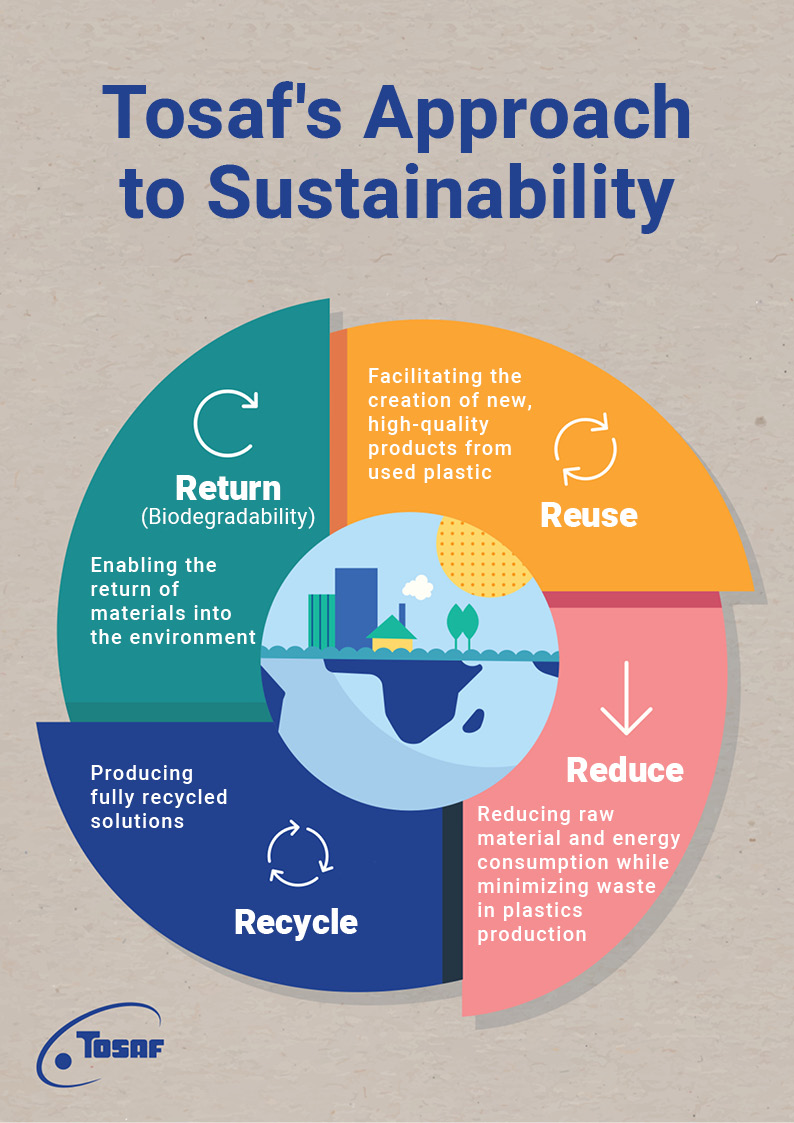The Green Path – Tosaf Invests in Quantifying and Cutting Emissions
The company quantifies and reports its carbon footprint down to the product level, uses solar power, and offers a portfolio based on renewable and recycled sources.
As sustainability takes an increasingly prominent role in the plastics industry, companies are looking beyond just increasing recycling volumes. They are taking a holistic view of reducing energy consumption, treating wastewater and emissions, and assessing the carbon footprints of production facilities and products themselves.
This trend is being driven not just by regulations, but also by growing customer awareness and a focus on doing business with environmentally conscious companies. While the investment is significant, companies acting now will be better prepared for an inevitable tightening of future regulations. Tosaf is one such company leading the way.
Measuring the Carbon Footprint
Already in 2021, Tosaf underwent validation for the ISO 14064 standard for quantifying and reporting greenhouse gas emissions. This process is carried out annually by an independent third-party. “All of our production sites worldwide operate under the standard and report their data,” explains Tamir Stein, PhD, Tosaf’s Head of Sustainability. “Each year, we expand and refine our reporting level, which now covers the product’s full lifecycle, from cradle to grave and not just from cradle to gate.”
The carbon footprint is calculated not just for the production sites overall, but for the products themselves (LCA). This calculation is provided to customers upon request. “The reason customers are interested in our carbon footprint is their desire to reduce their own Scope 3 emissions, which is the most complex category,” says Tamir.
Scope 1 covers direct emissions like vehicle fuel combustion, estimated globally at 2,000 tons/year. Scope 2 covers indirect emissions like electricity use, estimated at around 30,000 tons. All other emissions fall under Scope 3, the largest category that rounds up to approximately half a million tons of carbon dioxide.
“Tosaf has made operational changes to reduce emissions across the different scopes. For example, switching to an electric forklift fleet and converting company vehicles to electric or hybrid to minimize Scope 1. Investing in new machinery and advanced controls to optimize energy and water use, along with solar panel installations to reduce Scope 2 emissions. For Scope 3, solutions include shifting production between sites to reduce shipping, selecting local suppliers, and finding alternatives to high carbon footprint products,” Tamir explains.
Another factor driving interest in the carbon footprint is Europe’s Carbon Border Adjustment Mechanism (CBAM) tax, initially covering concrete, steel, aluminum, iron, fertilizers, electricity, and hydrogen. Plastics are expected to be included soon, prompting preparation efforts among plastics manufacturers, especially European importers.
Portfolio of Sustainable Solutions
To meet the demand for sustainable products, Tosaf offers a range of solutions under its R4 approach: Reduce, Reuse, Recycle, and Return. Options include plant-based concentrates using coffee grounds and eggshells as fillers, polymers from renewable sources, and recycled polymers. These are supported by a collaboration with recycling facilities of various polyolefins like PE, PP, LDPE and polystyrene.
Environmental Reporting
Tosaf focuses on two insightful reports. The first, SASB, covers environmental pollution aspects, carbon footprint, waste levels, and more. The second is the climate risk report (TCFD), which analyzes climate risks that could impact operations, as well as the transition to a low-carbon economy and its future effect on the company.
“As a global masterbatch manufacturer in the plastic industry, sustainability is at the core of Tosaf’s operations. We take responsibility for minimizing our environmental impact by reducing carbon emissions across our worldwide facilities and product lifecycle. This commitment is reflected both within our plant operations and through our continuously expanding portfolio of sustainable solutions for customers. Tosaf will continue investing significant efforts in sustainability, reflected in reducing our carbon footprint based on the roadmap we are currently formulating,” concludes Tamir.
Further information about Tosaf contact us:
Ms. Sivan Nahum
Head of Sustainability
Tosaf Compounds Ltd.
Email: [email protected]

